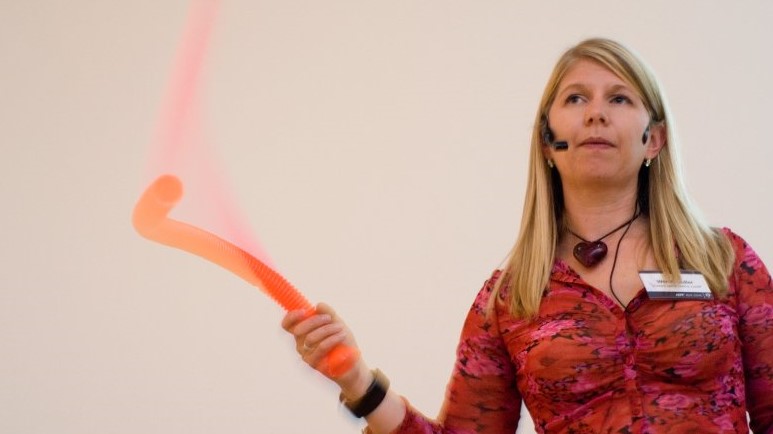“There are less primary school teachers in Wales with a physics background than there are lions in Wales.”
That slightly worrying statistic is from Wendy Sadler, founding director of science made simple, a science communication organisation based in Cardiff. Wendy has dedicated her life to inspiring the next generation of scientists, and engaging the general public with STEM (Science, Technology, Engineering, Maths).

science made simple takes big scientific concepts and shrinks them down to exciting science shows for school children of all ages. “We always write them [the shows] with the idea that we’re trying to make it very clear that anyone can do science. It’s partly about making people feel more comfortable with science.”
That’s important, she explains, because everyone benefits from having a better understanding of science, and so does democracy. “I think it’s really important that people feel empowered to go and find their own information so that they can use evidence to make decisions.”
She also thinks that there is a more cultural argument to be made for science. “I love that fact that you can discover it in everyday stuff. We all use music to enrich our lives, there’s no reason why science can’t be just for the hell of it. It can be part of our cultural heritage, I think people just don’t see it like that.”
Growing up, Wendy wanted to be a zoo keeper until she realised she was squeamish around blood. Instead she followed her other passions, studying music and physics at university. After graduating she worked at Techniquest, a science centre in Cardiff Bay. It was there she realised that being a science communicator could be a career. “The whole sector was quite young at the time, it was just starting out in the UK.”

“The education director at the time asked me to have a go at presenting in the science fair, and I was absolutely terrified. I was never a person at school who was really confident, and so when I stood on that stage and did some stuff, and saw the reaction that it could get, I got such a buzz. It feels like such an honour in a way to be able to do something where you can even change the slightest bit of someone’s thinking process.”
Wendy went on to found science made simple after finishing a lecture tour of the UK with the Institute of Physics. Even after the tour had ended, schools kept ringing up and asking if she could perform the shows for their pupils. “It made me think that there’s a need,” she says, “I felt schools were sort of saying, ‘Well, our biology experts can teach physics, and that’s what they have to do, but they don’t really love it.’” Wendy believes teaching comes across very differently when you’re talking about things that you love, which can have a big impact on how the pupils feel about science.
“I think maybe they’ve got a bit hung up on measuring the wrong things. The sort of exam based testing of regurgitating information rather than actually allowing people to make discoveries of their own.” says Wendy, explaining why she thinks students leave school without an appreciation of science. “When you’re at school science is taught as a finished thing, and so that kind of curiosity and hunger to know more doesn’t ever happen.”
science made simple aims to address that problem by showing all the amazing ways science impacts our everyday lives. Schools can book presenters to come and put on a wide variety of shows full of practical demonstrations. Whether it’s the science of sound and music, or examples of famous women in science (in a show called the XX factor), science made simple shows are designed to complement student’s education and mesh with the curriculum.

Wendy has also appeared on TV as the resident scientist on the Alan Titchmarsh show, and given TED talks and high-profile lectures. However, she still feels that there is something special about being in the same room as the audience. “The impact might be less in terms of millions of people, but I think that people feel like they know the person in the room better, whereas it takes a while to learn to trust someone on telly.”
TV also has the issue that it can be hard for presenters to represent science the way they want to. “Until you’re of the seniority and years of experience as David Attenborough you get moulded by TV people often who aren’t scientists into reinforcing stereotypes, and that’s troubling because when you’re new you can’t stand up and say, ‘Well I’m not doing it if you make me wear a white lab coat.’ Because that’s what they want. It can be really frustrating.”
Wendy remembers presenters coming in to her school when she was a pupil. “I loved the fact that it felt like they had taken the time to come and share a passion with me. It felt like quite a special thing.” She says that while the science in her shows is important, the real aim is to change the way people are feeling, and face to face communication is the way to do that.
Since science made simple was founded, the appetite for quality science communication in the UK has increased and the company has grown. “Having to run the business and look after the funding bit means I’ve forgotten what it’s like to perform.”
That said, when she gets the chance, Wendy still loves to present. She recently gave an Institute of Physics Christmas lecture, and took the excuse to update some of her old material. “I love the research part of the job when you’re going out there trying to make what can be quite abstract science approachable. I love spotting the patterns. I think that’s the essence of science really, spotting patterns and connecting things.”
